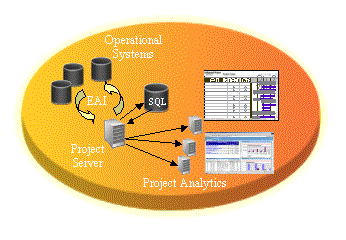|
Enterprise Project Management (EPM) is the ability to manage
initiatives and resources across the entire enterprise. When considering an EPM solution, it's best to recognize the process
and organizational impact to overcome the most significant challenge with any package, which is ADOPTION.
Microsoft's
Project Server (currently MS Office Project Server 2003) can be characterized as ERP for project management that accommodates
your process, not the other way around. As such, it requires careful analysis, design and configuration to be effective. Based
on the .NET framework, project server is poised to accept extensions to further customize the application. These extensions
can be used to achieve "Business Integration". With supplied API’s and a relational database foundation (SQL Server), it can
integrate with your other operational systems. It is one package solution that adapts to your business model and enables process
improvement.
|
|
RwB Business Consulting has a variety of service packages
to implement EPM:
1) Gap Analysis
Determine the fit of an EPM solution.
2) Strategy
Establish an
overarching EPM strategy.
3) Proof of Concept
Deploy a team to accomplish a reduced scope
implementation.
4)
Pilot Implementation
Define a subset of the organization to perform an
initial implementation.
5) Multi-department
– Limited Production
Extend the Pilot to include a larger set of the
organization.
6) Enterprise Implementation
Provide the solution throughout the entire enterprise.
|

Illustrative
EPM Architecture (with data integration)
|
|
RwB Business Consulting
welcomes the opportunity to discuss the services above with you in more detail. EPM, or Project Portfolio Management (PPM),
is achievable with a recognized toolset. See this Gartner
Group study.
|
Using MS Office Project Server can enlighten, empower and propel an organization forward
with the proper implementation partner. Please contact us to examine our proven approach to success.
© 2010 RwB Business Consulting, LLC. All rights reserved.
|



